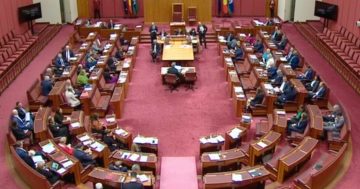
Attorney-General Mark Dreyfus is facing Crossbench opposition to his plan to change the Administrative Appeals Tribunal. Photo: File.
Attorney-General Mark Dreyfus’s push to reform the Administrative Appeals Tribunal (AAT) has hit a roadblock, with Crossbench MPs raising concerns a new forum could be too easily politicised.
It’s precisely political interference that the A-G says he wants to erase by restructuring the AAT, which has been plagued with a backlog of cases and claims of political bias.
Mr Dreyfus introduced a bill late last year to replace the AAT with what he says would be a more efficient body – an Administrative Review Tribunal (ART)– and one that is not loaded with political appointees.
A requirement of the new ART would be that appointments to the tribunal be merit-based only.
But some Crossbench MPs say the bill doesn’t guarantee a new-look tribunal wouldn’t still be at risk of political interference.
Independent MP Kate Chaney, who sits on the House committee examining the bill, pointed to what she described as a loophole to allow an Attorney-General to override the merit-based process.
The Labor controlled committee tabled its report in parliament on Wednesday (28 February) and endorsed the bill in its current form.
But in her additional comments included in the report, Ms Chaney suggested appointments to the ART should be dealt with by a panel and not by simple regulation.
“My concern is that to ensure an effective transparent and merit-based process, the appointment process must be protected from politicisation,” she said.
“Appointments to the ART should not be able to be used as a reward for political allies …
“The regulation model relies on the perceived safety net of ‘merit-based’ appointments and future flexible regulations.
“Given past issues with politicisation of appointments, I am not satisfied that these issues can be appropriately addressed in regulations.
“The bill should enshrine key safeguards to avoid the politicisation of appointments in the future.
“Future governments could reduce the appointment process safeguards by changing the legislation, but this would be subject to greater scrutiny of the parliament if it requires a change of legislation rather than only a change in regulation.”
Ms Chaney said there were two fundamental safeguards that “as a minimum” should be included in the legislation.
These are a requirement that the minister establishes a panel and the requirement that the minister can only appoint a candidate shortlisted by the panel.
“The politicisation of appointments is not a matter to be dealt with by a gentle regulatory model,” she said.
The Federal Government has the numbers in the House of Representatives for the A-G’s bill to get up in its current form.
But it will be a trickier situation in the Senate.
The Coalition is already threatening to vote against the bill, so the government might need Crossbench support in the Upper House.
In their additional comments included in the report, Coalition members on the House committee said the government was trying to “ram this bill through parliament with as little scrutiny as possible” through a short committee process over the Christmas period and only one day of hearings.
“Coalition members are pleased that the Senate’s Legal and Constitutional Affairs Legislation Committee will examine this bill in greater detail, with a reporting date on 24 July 2024,” they said.
“This is appropriate. The Coalition will participate in the Senate’s inquiry into this significant legislation and provide its views on this bill when that process is completed.”
Without the Opposition’s support in the Senate, the government will need the votes of the Greens and at least two independent senators.
The Greens are willing to negotiate with the government but have also expressed concerns over the selection process.
Independent senator David Pocock and Jacqui Lambie also seem to be backing Ms Chaney, insisting that a panel must be required to appoint members to the ART and not be easily ignored by a minister.
Mr Dreyfus is backing his bill in the current form but has signalled a willingness to consider amendments to the legislation.



















